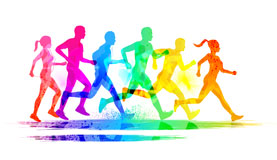
SPORTS PHYSIOTHERAPY IN MARBELLA
Sports Physiotherapy is a specialisation of Physiotherapy, which is aimed at all those people who practice sports on a regular basis, whether as part of a basic, amateur, elite and/or sports-health practice. In this case, the function of the Sports Physiotherapist will be the application of the treatment by means of physical agents, such as electrotherapy, thermotherapy (heat), manual therapy, hydrotherapy and therapeutic exercises in different special techniques, to focus their objectives, destined exclusively to the recovery and sports readaptation of the injured patient. Likewise, the Sports Physiotherapist must have anatomical, physiological and pathomechanical knowledge of the sports injury. On the basis of a medical diagnosis (usually from traumatology), a protocol and a correct treatment of exercises and therapeutic tables personalised to each case will be carried out.
To emphasise and stress the utmost importance and priority of the physiotherapist, to initiate in the PREVENTION of the athlete's injuries, creating, as we have mentioned above, a personalised treatment protocol for each case, as well as a specific pre-competition and immediate post-competition treatment.
The Sports Physiotherapist must recover the functionality of the athlete as soon as possible, accelerating the biological processes of recovery from the injury, limiting their training as little as possible and ensuring that they can return with the greatest guarantees of success.
Preventive treatments:
These are used to improve the muscular conditions of the athlete, avoiding large overloads, using sports massage to relax or tone up (depending on the moment in which the session is carried out, or if there are competitions in sight, if the competition has finished...etc), as well as the execution and the manoeuvres to seek the desired effect.
In this way we will avoid the risk of injury to the maximum, we will improve sporting performance by ensuring that the muscles are in the best possible condition, we will increase muscular elasticity and flexibility, we will improve adaptation to effort, as well as the positive effects on the athlete's state of mind and psychological state.
Treatments of the injury:
These could have been avoided through proper prevention and other guidelines. Normally these injuries are caused by several factors such as poor training planning, use of bad techniques, lack of muscle strengthening exercises, additional overloads from over-exercising, poor stretching, etc.
Objectives of injury treatment:
- Treat sport-specific injuries.
- To reduce recurrences or possible relapses of the lesion.
- Establish behavioural guidelines to facilitate their recovery.
- To accelerate the biological processes of injury repair as much as possible.
- To recover the maximum functionality of the affected segment in the shortest possible time.
- Readapting the athlete to the return to training in order to subsequently readapt him/her to the effort.
- To achieve a compromise between the athlete and the physiotherapist in order to optimise
an improvement in the treatment, as well as an initiative on the part of the athlete to achieve his or her recovery objectives.
Most common types of treatment:
- Tendinitis/tendinosis (patellar, infraspinatus...), and other tendinopathies.
- Muscle injuries such as fibre ruptures, muscle strains,
contractures, overloads, contusions. - Meniscopathies.
- Osteopathy of the pubis.
- Shoulder rotator cuff injuries.
- Capsulo-ligament injuries (sprains, ligament strains,
dislocations and joint subluxations). - Joint instabilities.
- Functional bandages (neuromuscular bandages or Kinesitaping).
- Unloading massage.
- Postoperative recovery from surgical interventions such as ligament or knee tendon replacements,
or as in shoulder tendon replacements and tendon reinsertions. - Sports Massage (pre and post competition).
- Re-education to effort.
- Application of techniques to improve sporting
performance (eccentric work, proprioception,...). - Musculo-articular and postural assessment of the athlete.
Call us for an appointment... and start feeling better tomorrow!